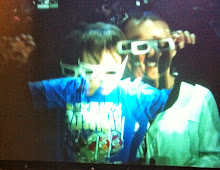
TODAY'S ACTIVITIES:
- Library "Field Trip"
In my last post, I wrote about how I would like to start praising my son's efforts--as opposed to his achievements--in an attempt to teach him to place less emphasis on "success." He already shows some signs of performance anxiety, at times not wanting to try things, uttering, "I can't do that!" I feel like Parker would attempt more, and persevere through challenging tasks more often, if he didn't place so much weight upon doing well. My friend, Jen S., commented on yesterday's post, recommending that I read Alfie Kohn, an author who advocates "unconditional parenting." I came across an article by Kohn in the New York Times back in September, in which he stated, "Some people who wouldn’t dream of spanking choose instead to discipline their young children by forcibly isolating them, a tactic we prefer to call 'time out.' Conversely, 'positive reinforcement' teaches children that they are loved, and lovable, only when they do whatever we decide is a 'good job.'" Those words gave me pause when I read them last fall. I revisited them this afternoon upon seeing Jen's comment and, again, I had to stop and think. Later on in the article, Kohn said that unconditional parenting should be accompanied by "explaining reasons for requests, maximizing opportunities for the child to participate in making decisions, being encouraging without manipulating, and actively imagining how things look from the child’s point of view." I feel like I do all those things pretty well. What I don't do well is keep mum when my kid does something I find amazing. If I agree with Kohn's assertion that heaping praise upon Parker when he accomplishes something I deem to be great (that is to say, "positive reinforcement") sends him the message that my love is contingent upon what he achieves--and I do tend to agree--then I really need to work on not voicing my judgments. It was so easy to get into the habit of saying, "Wow! Look what you can do!" when Parker was a toddler and just beginning to do things like walk and talk; those were exciting times. Now I'm realizing that my kid doesn't need me to tell him that he's performed well because he can (and should!) judge for himself. This, to a degree, falls in line with the educational philosophy of the Montessori method. The "control of error" included in each Montessori activity lets the child see on his own whether he has made any mistakes; he doesn't need to sit there, waiting to find out whether his teacher will give him a gold star. I think I will read some more Alfie Kohn, starting with his book, Unconditional Parenting. One of the great side effects of this homeschooling experiment is that I'm becoming more mindful of myself as a mother. (Not that I was out to lunch before, but there have been some definite "auto pilot" days.)

I am honored to be mentioned in your post.
ReplyDeleteJosh and I ascribe to Kohn's philosophy and combine it with Dr. Gottman's "Raiding an Emotionally Intelligent Child." It feels right, sounds right, is backed by research, and does fall in line with Monte philosophy and practice. Moving away from praise and eschewing time-outs will get you raised eyebrows, however. It's like being a vegetarian - if the majority of other people do it the X way and you do it the Y way, you must be prepared to defend Y with all your might.
Everything we do and say reflects a philosophy, though, doesn't it? So, we need to choose with open eyes. I think.
I want to know what you think after you read.